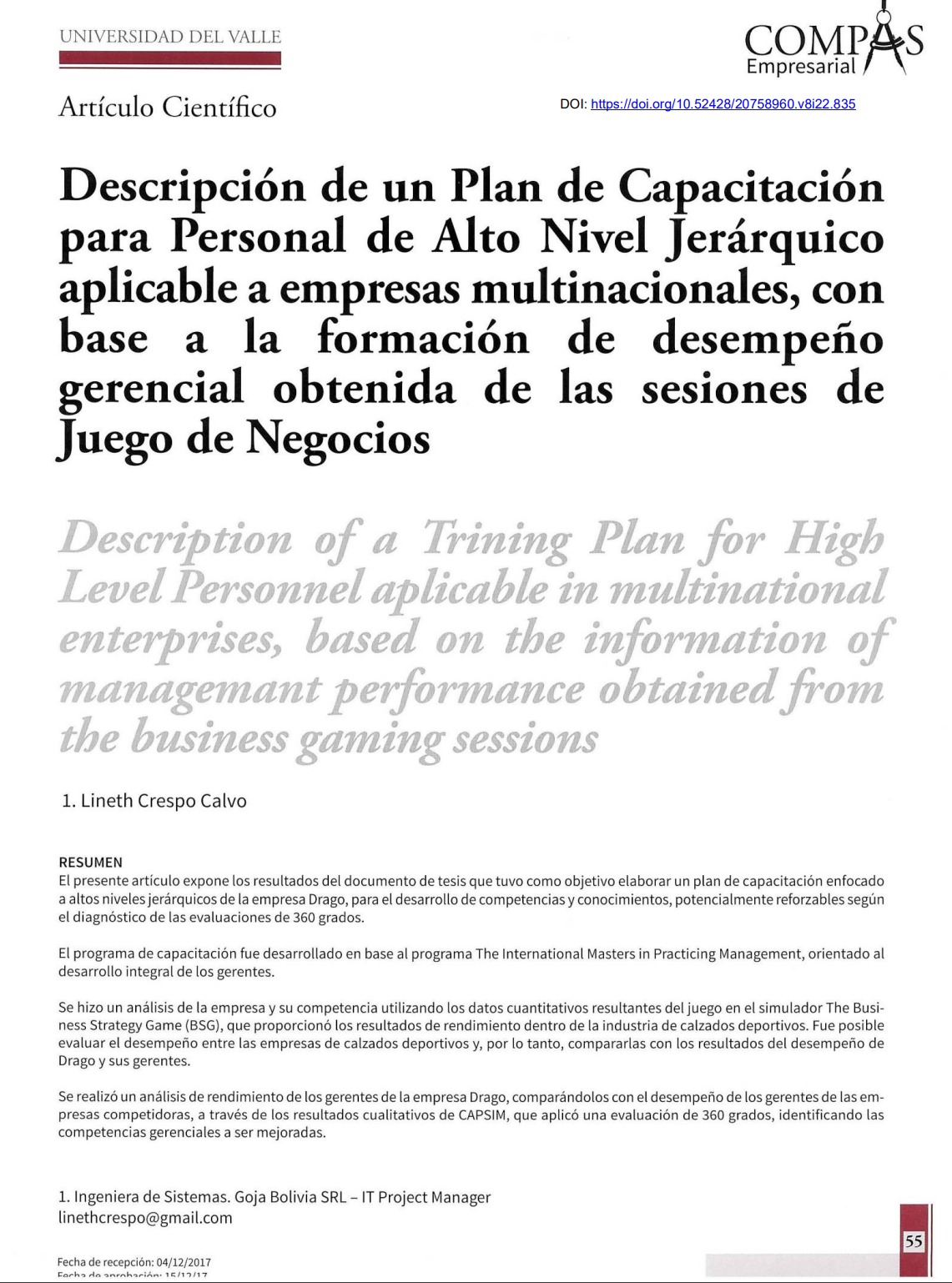Description of a Trining Plan for High Leve/Personnel Aplicable in Multinational Enterprises, Based on the Information of Managemant Performance Obtained from the Business Gaming Sessions
DOI:
https://doi.org/10.52428/20758960.v8i22.835Keywords:
Training, Managers, Reflection, Analysis, Collaboration, Changes, Performance, CompetencesAbstract
The article presents the results of the thesis document which has the target to elaborate a training plan focused on high leve[ of the company Drago, for the development of skills and knowledge, potentially reinforceable according to the diagnosis of 360 degree evaluations. The proposed staff training program was based on The lnternational Masters in Practicing Management program, which is oriented to the integral development of the managers. An analysis was made of the company and its competition using the quantitative data resulting from the simulator game The Business Strategy Game (BSG), which provided the performance results within the industry of sports shoes. lt was possible evaluated the performance between the diferent sport shoes industries and therefore compare them against the results the performance of Drago and its managers staff. A performance analysis was executed of the managers of Drago company wich compared against manager's performance of the competition companies, through the qualitative results provided by CAPSIM which applied a 360degree evaluation, identifying the managerial competences to be improved. The proposed staff training program for the sport shoes Company Drago was planned for it will allow the managers of it company to increase their performance, of the a reas under their care and the company in general through reflection processes, analysis, knowledge of the environment, applying changes and collaboration networks, experiencing theory in practice.
Downloads
References
(1) Serradell, E. (2014). El uso de los juegos y simuladores de negocio en un entorno docente. Consultado en diciembre 2017. Recuperado de: http://oikonomics.uoc.edu/divulgacio/oikonomics/_recursos/documents/01/serradell-es.pdf https://doi.org/10.7238/o.n1.1407
(2) Miranda, M. (1993). Juegos de empresa. Herramienta para entrenar, desarrollar e identificar potencialidades. Consultado en diciembre 2016.Recuperado de: http://www.iacat.com/l-Cientifica/JUEGOSDEEMPRESA.htm
(3) Alles, M. (2005). Desarrollo del Talento Humano: Basado en Competencias. Buenos Aires, Argentina: Granica.
(4) Capsim (2017). Multisource Assessment Tool far Business Schools to Measure Soft Skills. Consultado el 23 de enero 2017. Recuperado de: http://www.capsim.com/assessments/capsim360
(5) Chiavenato, l. (2009). Gestión del Talento Humano. 3ra ed. México. D. F. México: Me Graw Hill.
(6) Chiavenato, l. (2011). Administración de Recursos Humanos 9na ed. México. D. F. México: Me Graw Hill.
(7) Mintzberg, H. (2005). Directivos No MBAs. 2da ed. España: Ediciones Deusto.
(8) Vara, A. (2015). Los 7 pasos para elaborar una tesis. Lima, Perú: Macro EIRL.

Downloads
Published
How to Cite
Issue
Section
License
Copyright (c) 2017 Lineth Crespo Calvo

This work is licensed under a Creative Commons Attribution 4.0 International License.
Authors who publish with this journal agree to the following terms:
- Authors retain copyright and grant the journal right of first publication with the work simultaneously licensed under a Creative Commons Attribution License 4.0 that allows others to share the work with an acknowledgement of the work's authorship and initial publication in this journal.
- Authors are able to enter into separate, additional contractual arrangements for the non-exclusive distribution of the journal's published version of the work (e.g., post it to an institutional repository or publish it in a book), with an acknowledgement of its initial publication in this journal.
- Authors are permitted and encouraged to post their work online (e.g., in institutional repositories or on their website) prior to and during the submission process, as it can lead to productive exchanges, as well as earlier and greater citation of published work.









